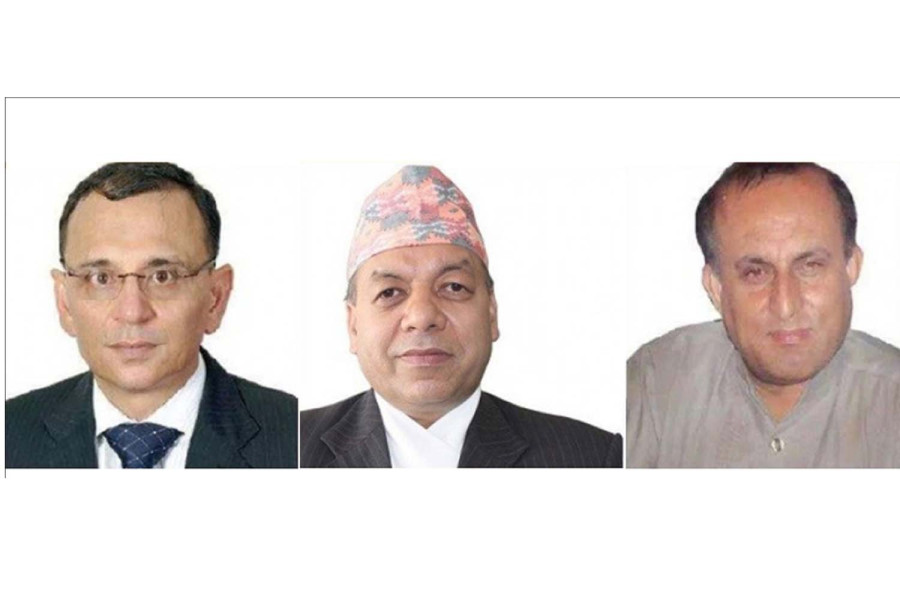National
Convicted former office bearers of Tax Settlement Commission sentenced to nine years in jail
Stakeholders say those responsible for forming the commission should also be brought to book.
Prithvi Man Shrestha
The Special Court on Tuesday determined punishment for three members of the now defunct Tax Settlement Commission (TSC) who were earlier convicted by the court for corruption.
In one of the biggest corruption cases of the country, the Special Court on June 1 convicted Lumbadhoj Mahat, chairperson of TSC, and its members—Chudamani Sharma, former director general of Inland Revenue Department, who worked as member secretary for the commission, and Umesh Prasad Dhakal—for corruption.
At the time, the court had not determined the punishment for them.
“The court on Tuesday sentenced Mahat to a prison term of nine years and one month, while the other two members will be jailed for nine years,” Deependra Nath Yogi, spokesperson for the Special Court, told the Post. “Each of them has been fined Rs4.1 billion.”
A three-judge bench of its chairperson Srikanta Aryal, Yamuna Bhattarai and Shaligram Koirala sentenced the former officials of the TSC on Tuesday, according to the Special Court.
In July 2017, the Commission for Investigation of Abuse of Authority had filed a corruption case against them at the court on the charges of embezzling Rs10.02 billion by each. Among the three convicts, Sharma also fights another corruption case for amassing illegal property. The CIAA had filed another case in the Special Court in January 2018.
In February 2015, the Sushil Koirala-led government had formed the TSC to settle the tax dispute under the Tax Settlement Commission Act-1976, which has now been scrapped.
Questions were raised about the conduct of TSC members after the Auditor General’s report released in April 2017 questioned the tax settlement by the TSC, saying various enterprises were given exemptions amounting to over Rs21 billion.
The parliamentary Public Accounts Committee (PAC) then wrote to the CIAA, asking it to investigate the matter.
In its charge sheet, the CIAA said that tax exemptions were given to certain enterprises without any concrete reason for doing so. For example, in the case of Ncell, tax authorities had determined the amount of tax at Rs1.82 billion, but the TSC settled the issue with a payment of only Rs900 million. “Although Ncell has the capacity to pay this amount of tax, and there was no concrete reason for tax exemption, the company was given a tax exemption with the ill-intention of causing loss to the government,” the charge sheet added.
Likewise, liquor companies, which were capable of paying taxes, were given tax exemptions on a large scale. In fact, five liquor companies alone got the highest tax exemption of Rs 7.66 billion. According to the charge sheet, TSC members overstepped their jurisdiction. As per the TSC Act, the TSC can handle cases only after they are withdrawn from the revenue tribunal. However, the TSC settled tax cases of 32 enterprises who had not withdrawn their appeals from the revenue tribunal.
Even enterprises that took value added tax (VAT) paid by the general public were given tax exemptions. As many as 20 companies that were involved in fake VAT bill scandals in the past, too, were given tax exemptions.
The TSC members also falsified their reports to the government by showing a lower amount than the actual amount of tax exemption. For example, the tax exemption given to Triveni Distillery stands at Rs4.01 billion in the charge sheet, while the TSC report shows the company was given a Rs3.29 billion tax exemption, according to the charge sheet.
The TSC members appear to have taken advantage of the provisions of immunity given by the now-scrapped TSC Act.
Clause 17 of the TSC Act says, “No case or legal action may be instituted or taken against the Commission, any member of the Commission or any person acting as per the order and direction of the Commission for any act and action done or taken or purported to be done or taken in good faith in accordance with this Act or the Rules framed under this Act.”
But questions were raised on whether the TSC members had performed their duties in good faith. With the latest verdict, those responsible for giving tax exemptions were sentenced. But questions have also been asked as to why those responsible for forming the TSC faced no scrutiny.
“Even those responsible for forming the TSC to give tax exemptions to big corporate houses should have been investigated, something which didn’t happen,” said Padmini Pradhananga, chairperson of Transparency International Nepal. “We have the tax authority bothering small taxpayers for small unpaid taxes, while there’s a commission that exempts tax liability of billions of rupees.”




 9.83°C Kathmandu
9.83°C Kathmandu














